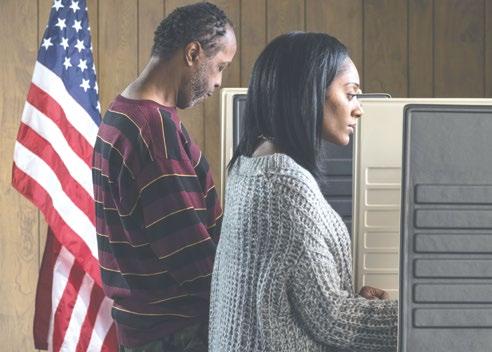
24 minute read
Could Black women voters hold the keys to the 2020 Election? South Florida influencers speak out
BLACK WOMEN VOTERS MAY HOLD KEYS TO 2020 ELECTION
BY MARCUS BRIGHT
Advertisement
African Americans are reminded every day about the importance of the upcoming 2020 elections as protests continue to erupt across the country demanding justice and a more equitable nation. One of the most pivotal and deciding voting blocs will undoubtedly be Black women. Their potential reach is also very potent as they are often not alone at the polls.
“Black women also bring their families along when they are voting,” said Jasmen Rogers-Shaw, a political strategist and candidate for Florida State House District 95. “They are voting for the interests of hundreds of people.”
Criminal justice and policing reform, affordable healthcare, racism, and equal rights — they’re all at the top of the list of issues facing AfricanAmerican women voters, according to the “Power of the Sister Vote” survey published by Essence magazine. Experts say this demographic could be a secret weapon at the polls. “One way to address current challenges is to vote,” said Dr. Valerie Patterson, a public administration professor at Florida International University. “You want to vote for the candidate, but you also want to send a message about the importance of inclusion and the importance of representation. I vote in the spirit of Fannie Lou Hamer and Shirley Chisholm.”
The level at which Black women will turnout is still very much in question. Dr. Olivia Jackson, a political science professor at Florida Memorial University, points to the decline in the voter turnout among Black women between the 2012 and 2016 Presidential elections as a big game changer in those tight races. The turnout for Black women dropped from 70.7 percent in 2012 to 64.1 percent while the turnout for White women stayed about the same from 65.6 percent in 2012 to 66.8 percent in 2016.
Generations of Black women voters
Generational differences are a factor in the motivation of why Black women will vote. Different generations have dealt with varying sets of challenges. Medicaid, Medicare, and Social Security are more pressing for older voters. Meanwhile, younger generations are facing burdens that older generations didn’t face at nearly the same level. For example, student loan debt. Younger college-educated Black women are faced with an enormous amount of student loan debt. They’re potentially faced with a lifelong financially-crippling economic albatross if student-loan debt cancellation is not voted a legislative reality.
Unfortunately, this is one of the primary reasons why some highly-educated Black
women from younger generations are in a worse financial position than their grandmothers were under the oppressive Jim Crow laws. According to the 2017 study “Women, Race, and Wealth,” Black women show negative median wealth at different ages regardless of marital status. Single black women in their 20s without a degree have zero wealth. The study also showed that the typical single black women with a college degree is $11,000 in debt. Married, college-educated black women in their 30s are $20,000 in debt.
Millennial Ann Marie Sorrell, president and CEO of the Mosaic Group, thinks there are not only generational differences, but differences based on people’s backgrounds and upbringings.
“Some issues are going to speak to some of us more than other, she said. “For example, I am an immigrant that spent most of my life growing up in the small town of Pahokee, so I look at things through a different window than others.”
Patterson, a member of the Baby Boomer generation, remembers learning freedom songs from the Civil Rights Movement as a student in a segregated school where voting was stressed.
“The idea that we are shaped by the major historical events of our respective generations applies,” Patterson recalled.
Florida State Rep. Anika Omphroy, D-Lauderdale Lakes, is a Xennial (born between 1977-1983). She believes the primary concerns among three generations of Black women in her family are the same.
“We work at it differently, but it motivates us the same to vote and be actively involved in our community,” Omphroy said.
Anna Stewart, a senior at FIU, is a member of the Black Student Union on campus and has been encouraging her fellow students to vote in the upcoming election. She believes her generation prioritizes healthcare, among other issues. “I think Black women voters are looking to be seen entirely by our elected candidate,” Stewart said. “Not only as Black individuals. Not only as women. We are looking to be seen as Black women.” There are several different factors at play. One is whether presumptive Democratic Presidential nominee Joe Biden will choose a Black woman as his vice presidential running mate. Sorrell said that would be a game changer, especially with the current climate of Black Lives Matter at the forefront. “There are a lot of deeprooted issues in our communities like gaps in wealth, homeownership, education, and health that a strong Black woman vice-presidential candidate would be able to bring to the forefront,” Sorrell said.
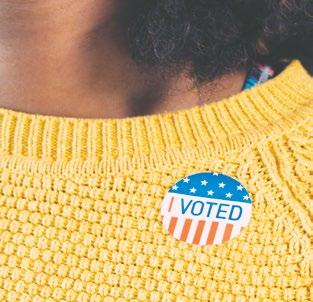
Black woman as next U.S. vice president?
Patterson suggests that a Black woman vice-presidential candidate would galvanize people similar to the excitement and enthusiasm around Barack Obama’s presidency. So would a significant number of Black women stay home if Biden decides to select someone other than who he promised?
“Do Black women want to see a Black woman on the ticket? Yes, but will they stay home if it is not a Black woman? I don’t think so,” Jackson said.
Still, there is no doubt that the selection of a Black woman as the vice presidential nominee would create an enormous momentum and galvanize a large portion of the Democratic party’s base.
It is clear, however, that Black women want much more than just a Black female figure in high political office. They want more than symbolism. They want substantive policy advancements that will create a better way of life.
“We must stop looking at personalities and start looking at people’s policies,” Omphroy said.
Sybrina Fulton, a candidate for MiamiDade County Commission District 1, suggests that policing and gun reform legislation are among the issues that will motivate Black women to participate in the electoral process.
“Black women will influence this year’s election cycle, not only locally but nationally as well,” Fulton said. “With the current climate of the country, local level voting will be instrumental as it relates to police and gun reform legislation.”
Black and white women voters
There is a clear delineation between the voting patterns of Black women and white women. Dr. Marcia Parker, a recent doctoral graduate from the College of Education at Loyola Marymount University, hypothesized that the economic factor was the main one that separated the perspective of Black women and many white women. Parker wrote: “Much of the differences in interpretations of the movement (feminist) were due to economic conditions facing Black families that were different from those facing white families.” Most of the racial wealth gaps that exist are a result of the lack of intergenerational wealth transfers available for Black families. That’s based on an array of reasons ranging from Federal Housing Administration policy, slavery, Jim Crow laws, employment discrimination, and denial of access to capital, to name a few. Ultimately, the priorities of Black women are the priorities of the nation. “There are so many things that are pressing down on Black people that should be in the top of everyone’s priority list,” Rogers-Shaw said. “Everyone should be centering Black women in their policy conversations. If we can address these concerns, we can drastically improve conditions for our country, state, and everyone.” With so much at stake, there is a level of intensity entering the 2020 election. People need a tangible change to their day to day life, not just flowery rhetoric. Voting is just the first step, but it is a very pivotal and essential step for substantial and sustained change to occur. “We have to have a multi-layered plan,” Sorrell said. “There is a place for everyone.”
With the Reopening of Miami-Dade County. Please support Black owned restaurants and hotels located in Overtown.


BLACK OWNED RESTAURANTS
Groovin Bean Coffee Bar & Lounge 801 NW 3rd Ave Suite #104, Miami, FL 33136 786-353-2566 www.groovinbean.com House of Wings Miami 1039 NW 3rd Avenue, Miami, FL 33136 305-371-6556 www.houseofwingsmiami.com J9 Smoothie Bar and Grill 801 NW 3rd Avenue, Miami, FL 33136 (786) 899-0615 www.restaurantji.com Jackson Soul Food 950 NW 3rd Avenue, Miami, FL 33136 305-374-7661 www.jacksonsoulfood.com Lil Greenhouse Grill 1300 NW 3rd Avenue, Miami, FL 33136 (786) 277-3582 www.lilgreenhousegrill.com Red Rooster Overtown 920 NW 2nd Avenue, Miami FL 33136 (305) 640-9880 www.redroosterovertown.com Two Guys Restaurant 1490 NW 3rd Avenue #108, Miami, FL 33136 305-374-1141
World Famous House of Mac 2055 NW 2nd Avenue, Miami, FL 33127 786 636-6967 www.houseofmac.com
BLACK OWNED HOTEL
EVENTS
Purvis Comes Home: Manchild in the Promise Land Presented by Hampton Art Lovers at the Historic Ward Rooming House 249 NW 9th Street, Miami, FL 33136 Opening Reception: July 3, 2020 | 6pm-9pm Exhibition Dates: July 3, 2020-October 3, 2020 RSVP @ www.HamptonArtLovers.com Folklife Friday’s Open-Air Market Every first Friday of the month: 11am-8pm 9th Street Pedestrian Mall (Adjacent to Lyric Theater) Vendor Info: 786-488-4972 Lyric Live Presented by Black Archives Historic Lyric Theater Amateur night monthly showcase. Every first Friday of the month. 819 NW 2nd Avenue Miami, Fl 33136 www.bahlt.org The Urban Craft | Culinary | Culture Friday, July 3, 2020 Happy Hour: 11am • Day Party: 1pm-6pm Night Party: 9pm-Until Saturday, July 4, 2020, Happy Hour: 11am Night Party: 9pm-Until 1000 NW 2nd Avenue, Miami, FL 33136
www.theurban.miami

BUSINESS REPORT Black-Owned Businesses Need Extra Help to Recover
BY BEATRICE LOUISSAINT
Since the COVID-19 pandemic began affecting the U.S. economy, the number of working black business owners in this country has fallen by more than 40 percent, according to the Washington Post. That is around 450,000 active black business owners who have either permanently shut down their companies or are currently not conducting business. Other minority groups have also seen drops: working Hispanic business

owners fell by 32 percent; working Asian business owners fell by around 25 percent and working immigrant business owners fell by 36 percent.
African-Americans already have the lowest business-ownership rate of any U.S. racial group, which means fewer black families benefit from the long-term wealth that research shows is linked to owning a business. In addition, minorityowned companies can be a catalyst for economic growth throughout their communities – they consistently employ other minorities and make purchases from other community businesses. Falling numbers of black business owners mean there will be more families in precarious financial situations.
Black-owned businesses are also less likely to recover from this pandemic disruption. A recent McKinsey & Company study shows that around 40 percent of black-owned companies’ revenues are in leisure, hospitality, transportation and retail. Only 25 percent of U.S. companies’ overall revenues are in these sectors, which are experiencing the worst effects of COVID-19 shutdowns and slowdowns.
There are other reasons minorityowned businesses are more at risk of failing during this crisis. McKinsey found that, historically, those that continue operating during and after a recession are about 60 percent less likely than peer businesses to receive all of the financing they require. In addition, research shows that black business owners are less likely to seek advice from professionals.
The Florida State Minority Supplier Development Council has initiated several new programs and expanded others to help minority-owned businesses through this crisis (fsmsdc.org/covid19). These include consulting and technical assistance to help businesses pivot to take advantage of opportunities related to COVID-19. We are also packaging loans for minority-owned businesses and helping them apply for grants.
Minority-owned businesses can also sign up for video conference sessions with the FSMSDC team and free webinars. Our SBA 7(j) Management and Technical Assistance program gives minority-owned businesses access to in-person and online training, one-on-one consulting, and meetings with federal agency representatives. Also, we launched a PPE Portal (fsmsdc.org/ppe) connecting Minority Business Enterprises that sell Personal Protective Equipment with corporations, health care organizations and individuals looking to purchase equipment. Our goal is to help as many companies as possible to not just survive but thrive during this crisis.
Beatrice Louissaint is president and CEO of the Florida State Minority Supplier Development Council), one of 23 regional councils affiliated with the National Minority Supplier Development Council. The FSMSDC acts as a liaison between corporate America and government agencies and Minority Business Enterprises in Florida and operates U.S. Department of Commerce Minority Business Development Agency Business Centers serving southern and central Florida. Learn more about the FSMSDC’s programs and services at fsmsdc.org, or call (305) 762-6151.
n
MEDIATION/ARBITRATION
The Basics of Online Negotiation/Mediation: Creating Value Through COVID-19
Good. Well mediation is a process and statement) where I addressed the attorneys’ 3. How will you participate differently technology allows for more flexibility… frustrations. It worked! when online? I am a third party impartial neutral without the authority to impose a decision/ solution… All of the rules of confidentiality apply, and all named parties are present correct? … Now, there may come a time where I may need to meet with the parties and their attorneys privately, or During the process, I used the online platform functions to meet separately during various times with the attorneys alone and with their clients. I was able to create trust in the process between the attorneys/parties and build perspectives that led to shared mutual goals and a 4. 5. Prepare a brief and concise opening statement that also captures your expectation with online negotiation, and your limitations. Be honest about what you want and where you are willing to go. Save ego the attorneys privately, or even in rare willingness to create a mutually satisfied for court. BY STANLEY ZAMOR (Editor’s Note: The following is Part 2 of a three-part series) “Thank you for allowing me to be your mediator. If you can clearly see/hear me, please give the thumbs up signal… Thank you. You are all not muted and I will do my best to make this feel comfortable and familiar. Thumbs up if you have participated in mediation and/ or negotiations using an online platform. circumstances just both parties together… You are encouraged and empowered to create your own solution that best satisfies your needs today and craft a Mutual Acceptable Agreement… Are there any questions? Let’s begin.” Creating Mutual Gains and Value Recently, I facilitated an online mediation where both attorneys expressed a frustration with the case and how the matter was being litigated during COVID-19. Everything was an issue, from document production requests/responses, to communicating with multiple revolving attorneys on the case. Nothing was consistent. The above are excerpts from my Mediator’s Orientation Statement (opening agreement. Not enough value is placed on the opening statement (and using an online platform makes it more difficult). Depending on the case and participant specifics, negotiators need to be flexible in their approaches and be prepared to reserve the “harsh-tactics” for face-to-face interactions or court. So, as you negotiate through online platforms think about the following: 1. What do you want out of the process and how will you approach it differently than the usual face-to-face interactions? 2. How have you responded to conflict or the adverse opinions/positions of the other side? Stanley Zamor is a Florida Supreme Court certified circuit/family/county mediator and primary trainer and qualified arbitrator. Zamor serves on several federal and state mediation/ arbitration rosters and mediates with the ATD (Agree2Disagree) Mediation & Arbitration, PA throughout Florida. As an ADR consultant, he regularly lectures about a variety of topics from ethics, cross-cultural issues, diversity, bullying, and family/business relationships. szamor@effectivemediationconsultants. com; www.effectivemediationconsultants. com; www.LinkedIn.com/in/ stanleyzamoradr (954) 261-8600 n


Mayor Gimenez Parent Waiver for Head Start Programs
Head Start and Early Head Start that labeled UTD’s concerns as existed during this pandemic. My programs primarily serve low “insidious race-baiting for negative perspective is further amplified income families in Miami-Dade, political purposes” and ensuring the by my one-of-a-kind view into the many of whom are considered public that the county is following educational inequities that children essential workers and who have “CDC social distancing and are experiencing through no fault no other options for child care or sanitation requirements,” Mayor of their own, but simply because of access to health insurance. Despite Gimenez is asking parents to sign a societal afflictions that continue a rising number of COVID-19 waiver clearly stating that providing to persist. With the continued rise cases in Florida, Mayor Carlos CDC measures in these settings is of COVID-19 cases in Florida, Gimenez has opted to increasingly “impossible.” and Miami-Dade being the put these already COVID-ravaged Furthermore, parents are epicenter, I find it unbelievable communities in danger by reopening being asked to sign off on their that these babies and their programs and establishments that child’s welfare while admitting that families are being put have not been secured to prevent participation runs a high risk of at higher risk in these spread of COVID-19 illness or even death to already vulnerable the virus. the child, themselves or communities.This
Last week, UTD launched other family members who may waiver should a public petition asking Mayor become exposed. not exist, and Gimenez to stop the opening of these “After having five family our community programs in the midst of increasing members test positive for COVID-19 should be COVID-19 cases in Miami-Dade and witnessing firsthand the outraged.” County. To date, over 3,500 people inadequacies of testing, I have n have signed. a unique perspective of the
Despite issuing a response dysfunctionalities that have United Teachers of Dade President Karla Hernandez-Mats
Miami Beach Monorail Consortium Led by Global Infrastructure Firm Meridiam
The Miami Beach Monorail Consortium is announcing the addition of a reputable, internationally-recognized company as project lead and partner: global infrastructure investment firm Meridiam. The company has over $8 billion in assets under management across the globe, and in Miami successfully completed the Port of Miami Tunnel on time and under budget, after taking over the project in the midst of the recession. This landmark sustainable and resilient infrastructure was delivered by a workforce of 7,000 people, 83% of which came from the local community.
Operation 305
2020 marks ten years since Meridiam broke ground on the PortMiami Tunnel. In preparation for the project, the firm launched Operation 305, an initiative to hire local and maximize its impact on Miami’s community. The team partnered with several organizations to onboard Miami-Dade workers, including the Overtown CRA, New Birth Enterprises, Laborers International Employees Union (LiUNA), and International Brotherhood of Electrical Workers (IBEW).
“The success of the PortMiami Tunnel would not have been possible without a strong partnership with hundreds of Miami companies with local knowledge,” said Christopher Hodgkins, Chief Executive Officer for

Port of Miami Tunnel. “Meridiam can now utilize the expertise gained through the Tunnel project to once again hire local workers and companies who will help deliver the monorail safely and efficiently.”
Next Project in the Pipeline
As workers from all industries are feeling the impacts of the coronavirus, African American communities have been among the hardest hit. In fact, a recent Pew Research Center Study found that Hispanic and black Americans have suffered the most severe economic impacts from the COVID-19 crisis, with an estimated 61% of Hispanics and 44% of African Americans surveyed saying they or someone in their household was laid off or had their wages cut.
The Miami Beach Monorail Consortium is proposing a monorail to connect Downtown Miami and Miami Beach, which would create an estimated 3,000 jobs and fulfill a public transit need that commuters and visitors have been demanding for three decades.
“We are excited with the possibility of delivering another cutting-edge infrastructure project in Miami that will serve the community for decades to come,” said Jamie Rubin, CEO of Meridiam Infrastructure North America Corp.
The monorail will run on an elevated track for 3.45 miles on the South side of the MacArthur Causeway, offering passengers a 5 to 6-minute ride. There will be two trains constantly operating, each holding up to 300 riders and serving up to 12 trips per hour. The monorail’s mainland transit hub will serve as a stop for the Miami-Dade County Bus and People Mover. Meridiam expects to deliver the project by 2025. n


DAPHNE CAMPBELL (DEM)

WILBUR HARBIN (DEM)

ERHABOR IGODARO (DEM)


SHEVRIN JONES (DEM)
FLORIDA STATE HOUSE DISTRICT 101

JOSUE LAROSE (REP)
BRIAN C. JOHNSON (DEM)
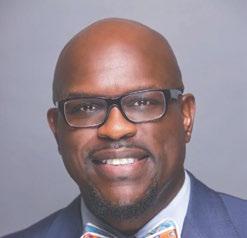
ASHIRA MOHAMMED (DEM)


VINCENT PARLATORE (REP)
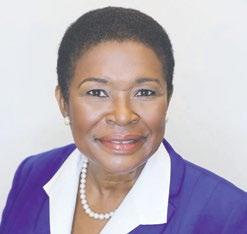
MARIE P. WOODSON (DEM)
FLORIDA STATE HOUSE DISTRICT 108
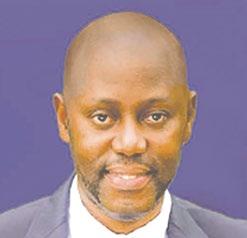
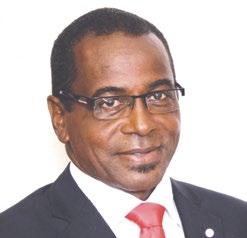

#BLM

CAREER LEADERSHIP & DEVELOPMENT Career Pivot: How to Make Your Next Big Move
Mary V. Davids, MS-HRM, career strategist

BY MARY V. DAVIDS
Are you not really feeling your current job or are you worried your current job is not feeling you? Selfemployed, but thinking of shifting gears into a new industry or going back into the workforce? Willfully or not, many people are taking a closer look at their career choices these days. If you’re thinking about changing your career, there are a few things you need to do before taking the leap.
1. Know what you don’t know. The best way to see what your chances are to get into a new industry or role is to find out what they need vs. what you have. You’ll need to compare the required skills to the skills you already possess. Knowing this can help you strategically prepare and possibly increase your knowledge base before applying for a new role or launching a new business.
2. What is working for you? I often tell my clients to use an “eat the meat and spit out the bone” method when struggling with big decisions. Consider what is really working for you such as your strengths, things you enjoy, or things you’ve always wanted to try, and discard the rest. It’s easy to point out what you don’t like, but if you don’t take time to sort out the things you do like, you could find yourself in a different place facing the same problem from which you tried to get away.
3. Know your level of risk. Fear is the No. 1 reason many people end up spending their lives working in jobs they hate. While moving into something new is scary, it can also be an exciting new challenge. You’ll need to educate yourself on as much as you can about your next move to help increase your level of confidence and to see how far you’re willing to stretch yourself before making your next move.
4. Ditch the résumé; Go straight to the source. Don’t get too wrapped up in what to put on your résumé more than you are about being intentional, direct, and creative about getting the role you want. Because you are stepping into something you’ve never done, it will require you to do something you’ve never done. Going the basic route of submitting your résumé online won’t work for pivoting. Try reaching out directly to a hiring manager, writing a letter, and mailing it directly instead of waiting for an applicant tracking system (not) to select your resume. LinkedIn is a great way to use your current network to help you connect with people you may not have access to directly. Tap into your online and offline network to see if they can aid you in reaching out to someone they know to make an introduction.
TECHNOLOGY Educators Should Prepare for Even More Online Instruction
n
BY KEVIN V. MICHAEL
As we navigate our way through this pandemic, one of the many facets of life that has been upended has been our educational system. Almost overnight, students and teachers from Pre-K through higher education found themselves thrust into online learning environments in an attempt to maintain some semblance of normalcy and finish the school year. Many school districts, administrators, and teachers were forced to quickly devise strategies to shift schools to virtual learning and oftentimes without the necessary planning or tools to overhaul the entire system of instruction and assessment. I will not even begin to comment on what the parents endured.
Kevin V. Michael, managing partner, Invizio

As a technology consultant to private and charter K-12 schools, I have had an opportunity to observe firsthand some of the challenges faced by administrators, teachers and students since COVID-19 struck. For the upcoming school year, here are a few ideas that can help make things easier for educators:
Have a Virtual Operations Plan
Consider what the upcoming school year may look like if your school is forced to suspend classroom learning or be required to operate at less than full capacity. Define the objectives, goals and measures to provide effective learning outcomes for students and assess teacher effectiveness. Think about the technology platforms and tools that align with these goals and consider how prepared your school is to leverage them.
Mary V. Davids is an executive career and leadership development coach and owner of D&M Consulting Services, LLC. For more career tips and advice visit www.slaytheworkplace.com or follow @MVDavids on Instagram and Twitter.
Proactively Address Digital Divide Issues
Disparities created by the digital divide were further laid bare because of the pandemic. Some districts experienced low student attendance rates to online education and inconsistent student engagement because of inequitable access to computers and Internet broadband in homes. Proactively identifying vulnerable students within your school community provides an opportunity to individually assess virtual learning readiness and remove obstacles that may prevent students from connecting to class.
Expand Professional Development for Teachers
Many teachers were forced to quickly build familiarity with a range of technology tools and applications needed to provide online instruction. Some were successful at climbing the learning curve, while others struggled with the new demands. Teachers should be offered additional learning opportunities to build competence with the technology tools they are using and the best practices to succeed in online classrooms.
Prepare Students for Online Learning
Online learning also requires a variety of competencies on the student side of the equation. Knowledge and understanding of the specific software applications that are to be used in the digital environment is a big factor in student success. Core skills such as typing, document creation, using email, or accessing and submitting homework assignments are all expected, but now students must also navigate video-conferencing and a variety of other online applications. Offering preparedness and training in these skills will help build student confidence and reduce the friction of the online learning experience.
Kevin V. Michael is CEO and co-founder of Invizio, a leading South Florida Managed IT Services Provider that provides outsourced IT management services to companies and schools, helping them operate more efficiently and reduce costs.
n

Knowledge. Growth. Unlimited Possibilities.
It takes 21 days to change a habit.
Join us for a unique opportunity to explore issues of race, power, privilege and leadership.
Daily emails invite you to read an article, listen to a podcast, watch a video or reflect on a personal experience -- all with the goal of inspiring our community to action.
Will You Accept The Challenge?
Dates: June 29 - July 27 Register as an individual or recruit a team at your organization! Visit www.ywcasouthflorida.org




